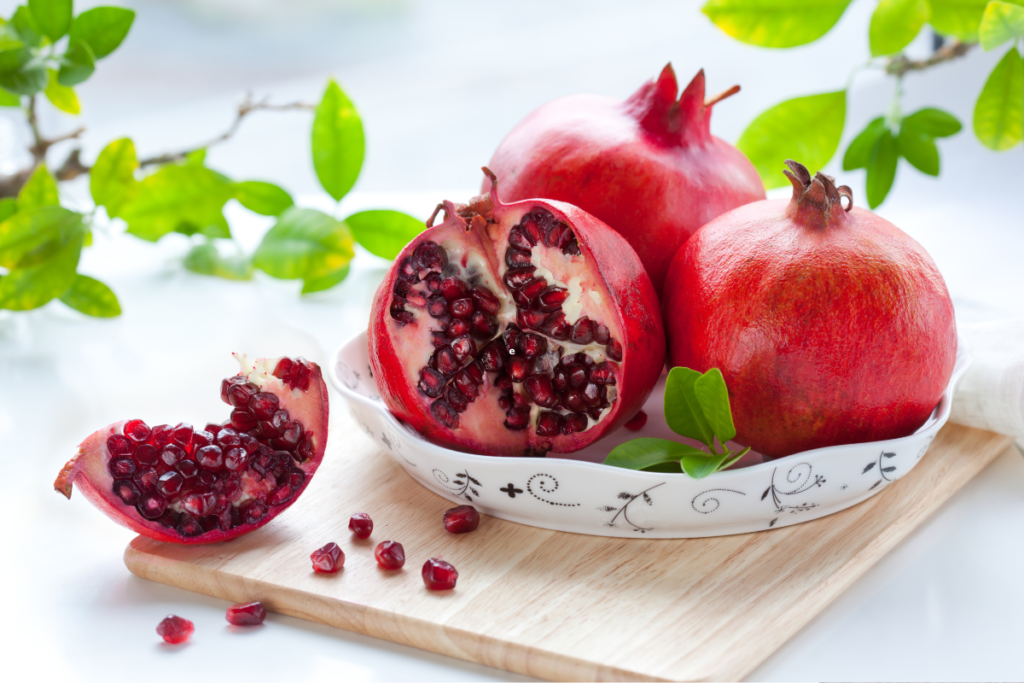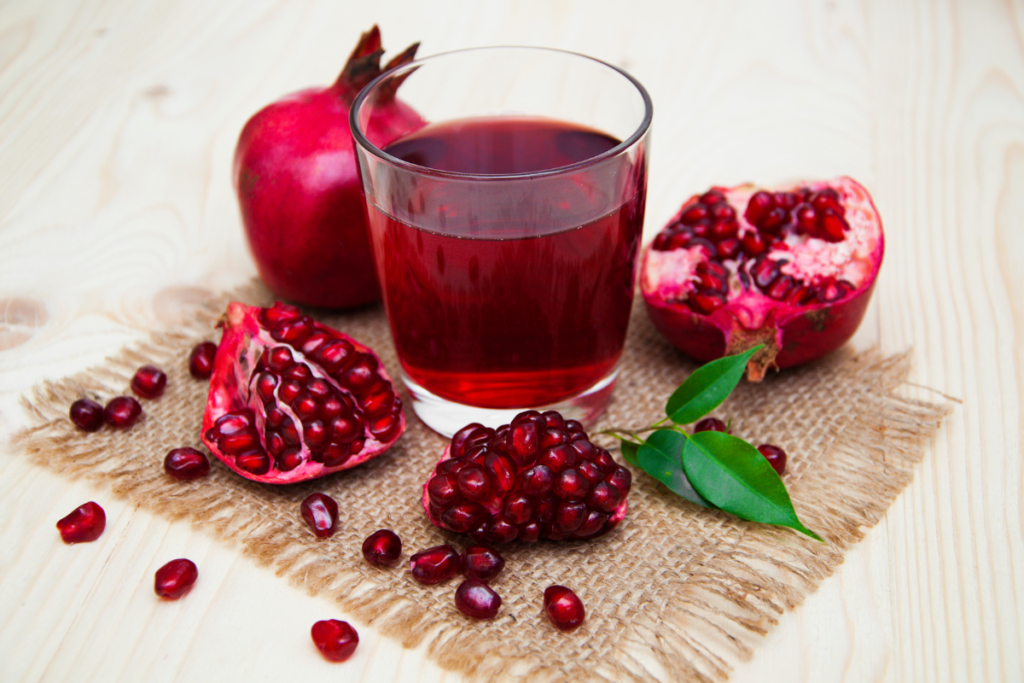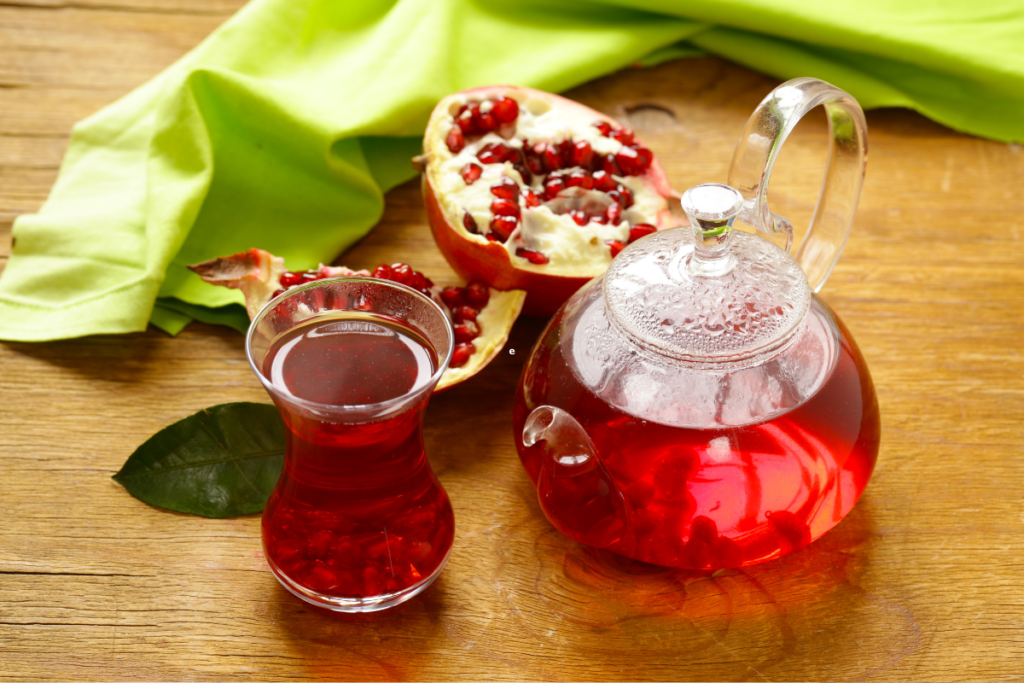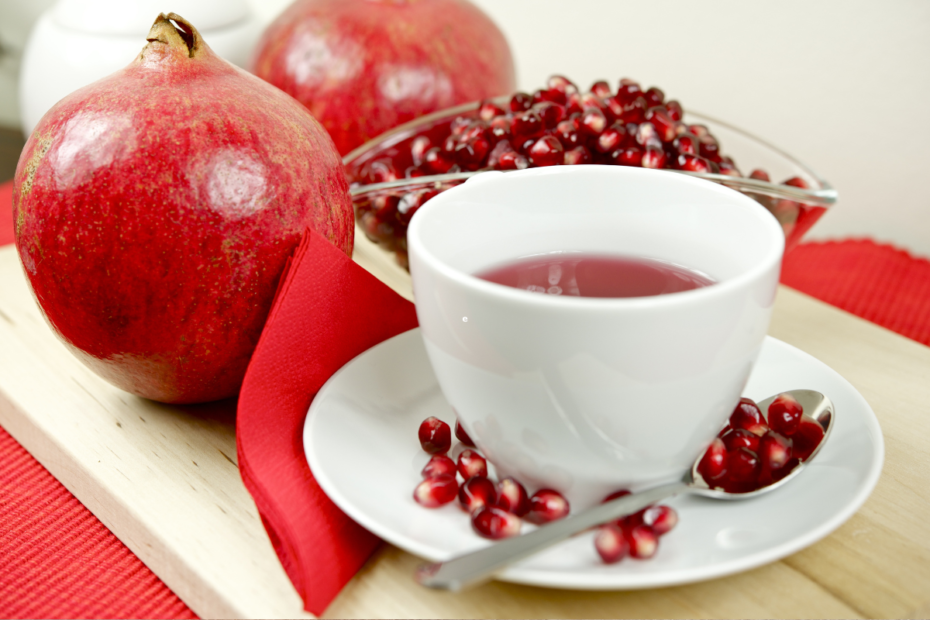Pomegranate tea is made from the various parts of the pomegranate tree (Punica granatum). It is a shrub or tree in the Lythraceae family that originated in Iran, Afghanistan, and Pakistan and is now widely cultivated in India, California, the Middle East, Southeast Asia, and the Mediterranean. You can make this tea from pomegranate flowers, leaves, and fruit peel. Depending on which parts of the pomegranate are used, the color can vary from light to dark red (burgundy), the smell is easily recognizable as pomegranate, and the taste is rather sour. Even the benefits of pomegranate tea vary. Industrially, the classic pomegranate tea is made from the petals and leaves of the pomegranate tree.
The pomegranate fruit, also known as the ‘pomegranate grain,’ contains around 600 seeds encased in a pulp, which you can eat and use in cooking. The pomegranate is rich in vitamins C, B6, B5, A, and E, as well as minerals calcium, iron, magnesium, phosphorus, zinc, folic acid, thiamine, and others.

Benefits of Pomegranate Tea
Pomegranate tea not only quenches thirst with a pleasant taste, but its composition also has health benefits:
- It can reduce stress and calm the nervous system.
- It helps normalize high blood pressure, improves cardiac functioning and vascular elasticity, prevents blood stagnation, and prevents the formation of atherosclerotic plaques thanks to the vitamins, essential oils, and amino acids it contains.
- Flavonoids, tannins, and vitamins reduce the symptoms of infectious diseases and inflammation, strengthen immunity, increase the body’s resistance to environmental influences, and positively affect thyroid function.
- Antioxidants improve the body’s metabolic processes and help burn stored fat faster. Pomegranate is suitable for losing weight and slimming; the tea can reduce appetite and increase satiety. It is also a good source of dietary fiber, which helps to keep the digestive system running smoothly and is satiating without adding many calories.
- For boosting immunity and for colds, pomegranate tea will provide you with the vitamins and fluids you need to help balance your body and help you recover faster.
- Thanks to its high content of antioxidants and polyphenols, pomegranate tea also has anti-cancer properties; it protects the body’s cells from oxidative damage that can lead to cell mutation.
- Pomegranate tea has antioxidant and antimicrobial properties due to its polyphenols, which can reduce the growth and spread of bacteria, fungi, and other microorganisms in beverages and foods. Drink this tea to improve overall health and reduce the risk of infections, particularly if you have weakened immunity.
- In the case of anemia, it will contribute to iron replenishment.
- It may protect your mouth against microbes that can cause oral problems.
- Pomegranate tea contains essential vitamins and minerals that stimulate digestion. It reduces intestinal inflammation, thus reducing the risk of intestinal diseases, and balances stomach acid levels. Due to its high fiber content, it can increase the production of beneficial bacteria, such as the bacteria in the stomach. Bifidobacteria and Lactobacillus in the digestive tract; pomegranate tea is an excellent probiotic. It is a powerful fuel for our intestinal health.

Pomegranate Tea for men
Pomegranate fruit, juice, and tea are healthy foods for both men and women. However, the benefits of pomegranate tea for men and their sexual health are exceptionally highlighted. Pomegranate tea, when consumed regularly, can increase testosterone levels.
Historically, pomegranate seeds have been considered a symbol of fertility and have been used as a fertility treatment in many cultures. This has led modern scientists to further investigate the benefits of pomegranate tea for the treatment of male sexual health conditions. The folic acid in pomegranates and the rich combination of antioxidants in the fruit play a significant role in treating infertility.
Recent studies suggest that pomegranates may be a natural prevention and treatment for erectile dysfunction. In any case, do not rush to throw away the medication you are taking; this topic is still under research, and the effectiveness for all patients is not 100% proven.
One study on the effects of pomegranate supplements on healthy adults found that pomegranate fruit can increase exercise endurance and muscle recovery. This means that improved physical performance can be beneficial not only on the sports field but also in the bedroom.
Pomegranate Blossom Tea
Add 1 tablespoon of dried pomegranate petals to a cup and cover with boiling water. Cover the cup and steep for 10–15 minutes until steeped. Strain the tea through a sieve and sweeten it with honey before drinking.
You can take pomegranate blossom and leaf tea in 1-2 cups daily.
Pomegranate Leaf Tea
Pomegranate leaf tea is usually made from powdered leaves, which can be stored for several years. It is easy to brew your own tea from this raw material. You can drink it as a hot or cold beverage.
flavor this tea with honey, sugar, or milk.
Pomegranate Seed Tea
Pomegranate seed tea is easy to make, especially as the prepared pomegranate seeds can be stored in the fridge for up to 1 month. You can always make a delicious, refreshing pomegranate seed tea whenever you brew the seeds with hot water.
You will need:
- pomegranate seeds from two large pomegranates (approx. 3.5 cups),
- 1 cup sugar.
Preparation process:
- Place the pomegranate seeds in a bowl and mash them to extract the juice.
- Add the sugar and mix well.
- Place the mixture in a glass jar; you can store it in the fridge for up to a month.
- Place about ¼ of the prepared pomegranate seeds and juice in a cup and cover with hot water.

Pomegranate Peel Tea
Pomegranate peel contains more beneficial elements than the blossom. The white membranes that separate the pomegranate fruit grains are rich in flavonoids. You can brew it either, but it can become bitter.
You can make tea from the pomegranate fruit peel at home. There are two ways:
- Cut the peel into small pieces and dry it. Grind the dried peel into a powder. Make pomegranate peel tea in the following ratio: 1 tablespoon of powder and 250 ml of boiling water.
- Cut the fresh pomegranate peel into small pieces and cover with boiling water. Be sure to wash the pomegranate thoroughly before peeling for possible pesticides left. Use organic or freshly picked fruits growing in your country instead.
Side Effects of Pomegranate Tea
Pomegranate tea can also cause adverse reactions. You should refuse this tea in the following cases:
- having chronic stomach, intestinal, or pancreatic diseases.
- You have hypersensitive gums (the acids in pomegranate tea can cause exacerbations).
- You are allergic to pomegranate fruit or other pomegranate products (e.g., juices).
- Do not give this tea to children under 3 years. Approach it gradually in light or small portions.
- If your blood pressure is always too low, pomegranate tea can lower it even further.
- Pomegranate tea for pregnant and breastfeeding women would be beneficial for supplementing iron and B vitamins. However, it is better to avoid it because of the possible adverse effects on your baby.
If you have any medical conditions or are taking medicines that may interact with this drink, it is essential to consult your doctor before drinking pomegranate tea. Enjoying this delicious tea in moderation will give you the most benefits. Do not drink pomegranate tea more than 1-2 cups daily. An overdose of this tea may cause symptoms due to excess concentrated substances: drowsiness, weakness, and nausea.
Sources:
https://www.webmd.com/diet/health-benefits-pomegranates
https://www.healthline.com/nutrition/12-proven-benefits-of-pomegranate
Associative photos from © Canva

